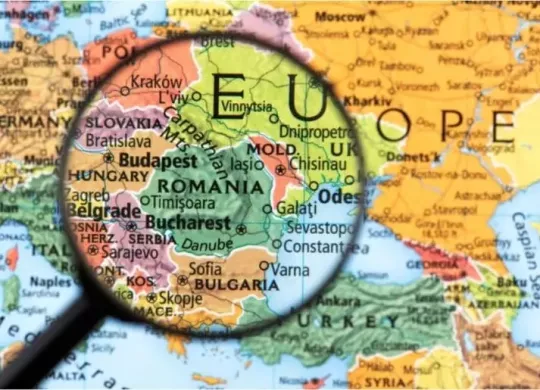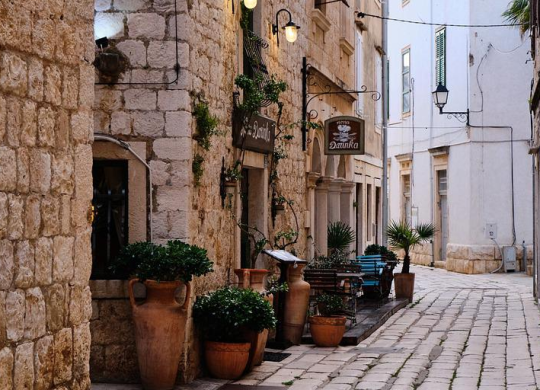Permanent residence in Romania: entry rules, available visa types, obtaining procedure and useful tips
Table of contents
- Rules of entry to Romania
- Types of visas to Romania
- Procedure for applying for a Romanian visa
- List of documents for obtaining a Romanian visa
- Temporary residence permit in Romania
- Permanent residence permit in Romania
- Documents required for obtaining a residence permit
- Advantages of obtaining a residence permit in Romania
- Citizenship in Romania
- Useful information about life in Romania
- Is Romania expat friendly?

Romania is a country in Eastern Europe that attracts expats with its growing economy and affordable cost of living. In order to move to the country for permanent residence, it is necessary to issue a visa and obtain the appropriate permission. Find out which rules for entering Romania are relevant in 2024 and how a foreigner can stay in the country for permanent residence
In 2024, Romania attracts not only tourists who come here to get acquainted with local history and culture, the state is also included in the list of the most promising destinations for expats in Eastern Europe.
Romania has a stable economy and a high level of development. The country is a member of the European Union, so foreigners will be able to get all the advantages of life in Europe here. Also, the country has quite high salaries, social assistance and full pension provision, which allows you to live here comfortably, add here an affordable cost of living and you will get an ideal place for migration.
Rules of entry to Romania
Entry rules and the list of documents that a foreigner will need to enter Romania differ depending on the expat's citizenship.
- EU and EEA citizens have the right to enter the territory of Romania without any visas and can stay in the country for up to 3 months.
If your stay in Romania exceeds 3 months, you must register your place of residence with the General Inspectorate of Immigration (IGI) in the county where you live. The registration certificate is issued on the same day when the application was submitted, the permit is valid for 1 to 5 years.
- Citizens of the rest of the world need to obtain a visa to enter Romania, which will vary depending on the length of stay and the purpose of the trip.
Types of visas to Romania
- Short-term visa (type C) is the most common visa, valid for travel to all Schengen member countries for stays of up to 90 days in any 180-day period. It can be issued for various purposes: tourism, business, visiting family or friends, participation in cultural or sports events, official visits, treatment, etc.
- Long-term visa (type D) – this visa is required if you plan to stay in Romania for more than 90 days. It is also possible to obtain a residence permit in Romania on the basis of this visa. Depending on the purpose of stay in Romania, permits are of the following types:
1. Economic activity – this visa is intended for persons engaged in economic activity in Romania in accordance with special rules.
2. Professional activity - this category is intended for persons who come to Romania to provide professional services regulated by Romanian law (eg doctors, lawyers).
3. Commercial activity - suitable for those who intend to carry out commercial activities in Romania, potentially creating a business.
4. Employment – a standard work visa for those looking for a job in a Romanian company.
5. Business trip – for a temporary business trip to Romania of employees of a foreign company.
6. Educational – this visa is required for students entering a Romanian educational institution for studies lasting more than 90 days.
7. Family reunification – allows family members of Romanian citizens or legal residents of Romania to join them in the country.
8. Scientific research - a special visa for researchers.
9. Other Purposes – This category may cover other long-term stays not mentioned above, such as remote work.
Procedure for applying for a Romanian visa
1. Collect the necessary documents.
2. Fill out the questionnaire.
3. Submit an application.
4. Wait for visa confirmation.
5. Make an appointment at the Embassy/Consulate of Romania.
6. Come to the appointment.
7. Pay the visa fee.
8. Get a visa.
List of documents for obtaining a Romanian visa
Standard package of documents for obtaining a visa card:
1. Foreign passport (valid for at least 3 months).
2. Two color photos (3.5x4.5 cm).
3. A copy of the national passport.
4. Confirmation of residence in Romania.
5. Medical certificate about the absence of serious diseases.
6. Certificate from the bank about the possibility of financing this trip and the availability of funds for living in the country.
7. Certificate of no criminal record.
8. Completed application form.
9. Reasons for entering Romania.
To move, travel or work safely in a new country, you will need health insurance. You can apply for an extended policy on our website here.
Temporary residence permit in Romania
For those who plan to stay in Romania for a longer time, it is necessary to issue a residence permit.
Foreign citizens who have entered Romania with a long-term visa can obtain a temporary residence/residence permit. The permit can be extended for 1-5 years by submitting an application with a set of documents required by the IGI depending on the purpose. The application must be registered no later than 30 days before the expiration of the permit or visa.
A temporary residence permit is granted only if the applicant:
- has a valid passport;
- has legal confirmation of housing;
- has national health insurance;
- is in Romania for the same purpose as the one on the basis of which the visa was issued.
Permanent residence permit in Romania
After living legally in Romania for 5 years, you can apply for a permanent residence permit. During this time, you can be outside the country for only half a year.
To do this, you need to submit an application for a permit to the territorial division of the Main Immigration Inspectorate.
Application processing takes approximately 30-120 days. Then you get a permanent residence card. You can renew the permit without any other additional conditions.
Documents required for obtaining a residence permit
To obtain the primary status of a temporary resident in Romania, the interested person provides the authorized bodies with:
- application completed in Romanian;
- passport for traveling abroad;
- confirmation of financial support;
- medical insurance contract;
- a certificate of no criminal record in the country of residence;
- confirmation of grounds for applying for a residence permit.
The dossier for obtaining a residence permit in Romania looks like this:
- confirmation of legal border crossing and stay in the country;
- medical insurance;
- certificate of income or its equivalent;
- confirmation of address registration in the country;
- a criminal record certificate issued by the authorities of Romania;
- certificates of civil status (if available).
Documents in a foreign language must be translated into Romanian, apostilled and notarized.
Advantages of obtaining a residence permit in Romania
On the basis of a temporary and permanent residence permit, expats can:
- It is legal to work in Romania and other EU countries;
- Open your business on favorable terms;
- Travel to European countries without a visa;
- Buy movable and immovable property at affordable prices.
Citizenship in Romania
After you have lived for 5 years as a temporary resident, 3 years with a permanent residence permit, you can apply for Romanian citizenship.
For this you need to submit documents:
1. A certified copy of the passport with a translation into Romanian;
2. Statement of your personal responsibility;
3. Documents on civil status;
4. Certificate of criminal record;
5. Birth certificates of children with translation and permission of parents to grant citizenship to children.
Useful information about life in Romania
Before you move to Romania, read some useful information about life here:
- Cost of living - the average amount of expenses for one person per month is 570 euros, the average monthly salary in the state is 720 euros. Property rental prices start at 200-300 euros for a one-room apartment located outside the city center.
Consider that Romanian residents pay mandatory insurance (health, property) every month and spend an average of 70–100 EUR on utilities.
- Opportunities for employment - despite the decrease in the unemployment rate in Romania, this indicator still remains at a high level compared to the countries of Western Europe - 5.4% as of 2023. A foreigner should make sure in advance that he will be able to get a job in the state after moving or have alternative sources of income, for example, a pension or salary received from foreign companies for remote performance of tasks.
- Primary and secondary education in Romania is free, including for residents of the state. Studying at a university will cost a foreigner 1,000–3,000 euros per year. Only citizens of EU member states can apply for free university education.
Is Romania expat friendly?
Romania is a tolerant and loyal country with a friendly and welcoming population. The principles of democracy and equality are upheld in the state, and any discrimination, including on the basis of nationality, is prosecuted. Foreigners can count on easy integration into society if they put in enough effort.
We will remind you! In the spring of 2024, Bulgaria and Romania partially joined the European Schengen zone of free movement. These changes have made traveling to countries easier for millions of travelers. Why tourists should visit Romania in 2024, read in this article.
Igor Usyk - Head of Migration department at VisitWorld
To ensure a safe move to a new country, I advise you to consult a specialist. My colleagues, qualified specialists with a legal education, will help you avoid unpleasant situations during migration.
Products from Visit World for a comfortable trip:
Checklist for obtaining a visa and necessary documents for Romania;
Legal advice on immigration to Romania;
Travel insurance for foreigners in Romania;
Medical insurance all over the world.
Recommended articles
3 min
Work
Due to the rapid economic growth of Croatia, more and more foreigners are planning to move to this country for employment purposes. Learn more about the specifics of obtaining a work visa and employment prospects in Croatia in 2024
16 Aug. 2024
More details3 min
Residence permit
Living in Italy is a dream of many people, because the country is distinguished by a high quality of life, amazing food, stunning landscapes and many other advantages. Learn more about the pros and cons of living in Italy, as well as the available ways to move
03 Jun. 2024
More details2 min
Travels
Citizens of the 99 countries eligible for short-term visa-free travel to Israel must now apply for an ETA-IL permit before traveling. Currently, the procedure for obtaining it is voluntary, but from January 1, 2025, it will become a mandatory condition for visiting the state. Find out what will change for visa-free travelers in Israel very soon
30 Jul. 2024
More details2 min
Travels
Citizens of third countries must obtain a Schengen visa to travel to EU countries. However, according to statistics, some countries approve visa applications more often than others. Find out in which countries the chance to get a Schengen visa is higher and when the permit may be refused
13 Aug. 2024
More detailsAll materials and articles are owned by VisitWorld.Today and are protected by international intellectual property regulations. When using materials, approval from VisitWorld.Today is required.
